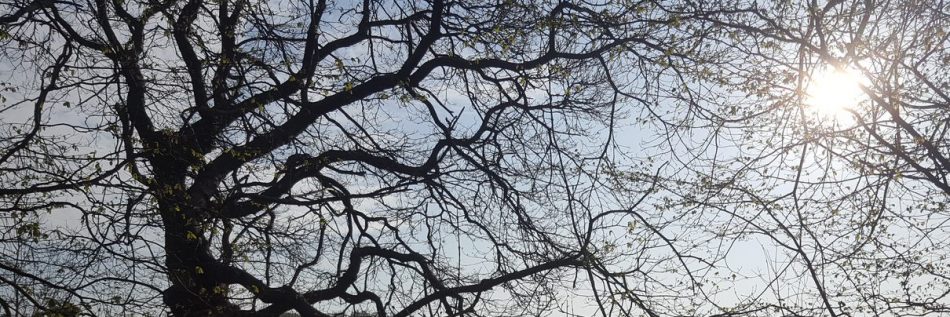Picture credit: Blest are those of integrity, 2000 (acrylic on board), Waddams, Ron (1920-2010) / Private Collection / Bridgeman Images
James Traeger and I have been working with ODN Europe to ask some fundamental questions about the future of organisational development. Here is our letter on where we see the future and ethics brought into sharp relief by the ongoing pandemic.
It is April 2020 and Covid-19 is ripping its way through the populations of the world. Both of us work in organisation and people development and are struck by the moral gravity of recent conversations. We have listened to people talking of their role in making mass redundancies of garment machinists in developing countries; laying off highly skilled people in the European pharmaceutical industry according to the rules dictated by American owners and the dilemmas of senior leaders weighing up the optics of releasing prisoners early into society. These are conversations unthinkable only weeks ago. Yet this is not the whole story. In nine days London has a new 4,000 bed hospital – one of the largest in the world. People have organised with their neighbours to support the old and vulnerable and there are companies that have turned their operations around to make ventilators, masks, sanitizers in just days. There have been extraordinary acts of kindness, flexibility and solidarity and yet there are we see examples that make the heart sink.
For those of us in the field of people and organisation development we are reminded of the impetus of a founding father, Kurt Lewin (1890-1947). Lewin was driven to make the world a better place having been horrified by the inhumanity witnessed in the Second World War. But we should not wait for hindsight to prompt us to consider how to make sure people act ethically. Petruska Clarkson (1947-2006), another luminary of humanistic psychology suggested we might use ‘midsight’ as reflexive awareness of our actions and mindset in the here and now is a better place to start. The world will be changed by this and we can help be better, by what we and the leaders we work with are doing right now. In all of this there is a question: what are the values of social justice that guide what we do? At some point history will judge us; each person, organisation, government and community. With the immediate transparency that is piped into our mobile devices, we will judge and be judged. Judgement starts right here, right now: the world is looking.
Over the past twelve months we have been working with ODN Europe, a professional body aimed at developing the theory and practice of organisation development (OD), to rethink OD. James has been working with others to ask the question: what is the future of OD? Rob and colleagues have focussed on the question: what are the ethics of OD? This pandemic brings the two together. At times of upheaval our true values come to the fore for both good and ill. It is now that those carefully crafted words in the corporate social responsibility policy are put to the test.
Even before the pandemic, organisations were changing unrecognisably. They have become loser, less connected and less bounded. This is characterised by long supply chains, networks of people coming together to work on projects and then moving on, casual employment and zero hours contracts and automation. But people have the same hopes, anxieties, worries, dreams and instincts that they always have. So, what is the role of organisation development? We believe that there are two important themes if we are to create better organisations and a wider society that Lewin might recognise. Firstly, the development of profound relational skills between people. In short, how people influence and how they are influenced in creating a better world. Secondly, to enable people to made sense of their experience, to challenge assumptions that would otherwise wash over them. All of this is serves the need for better decision making as well as social justice. We do not come to this from a privileged position of knowing the answers, instead we are part of a process of living inquiry of discovery and improvement.
The question is: how will we hold each other to account and bring about positive change? At its most radical, it is about everyday normal interactions that we all have as we understand the world, involve others and make decisions. It is not about abstract theory, policy or ‘key performance indicators’.
We propose three question areas that nest together, sitting at the heart of ethical practice. These are as follows:
Firstly, how we are planning for the future? Here the focus is on how our actions might impact people in the longer term. Questions include:
- How do I ensure that I ask the right questions before I decide on a course of action?
- How do I know when I have involved the right people and information in planning a course of action?
- How do I know if I have hurt or harmed?
- How will I know if I have done any good?
- How will I account for myself to others – what will I say in planning my course of action?
Secondly, how do we make the next step as we interact with others? Here are focus is in the here and now. Questions include:
- How will I develop awareness of the wider influences and contexts of what I am experiencing?
- How will I act in the network relationships in which some people are more powerful and others less powerful?
- How can I ask questions that will enable me to get more insightful views of conversation?
- How will I know that I have been ‘conditioned’ to act or think in a certain way?
Finally, In working with others how are we influence and how are we being influenced? Here we consider our impact on others. Questions include:
- How can we stop ourselves sleepwalking into poor and unethical decision making?
- How do we keep alive enough difference so that we can see our world with ‘new eyes’?
- How do we keep aware of the changing contexts and how this affects our stakeholders?
- How can we keep asking difficult questions of ourselves?
These are questions written in the first person; they are about ‘you’ and ‘me’, not the distant ‘them’. At this current time people are having to make extraordinary decisions where the normal structures and reassurance of knowledge and hierarchies are under enormous pressure as they change. This is becoming the new normal. If this is the case these questions of ourselves and those around us become ever more important. Today it might be about the pandemic but tomorrow we still face climate change, the impact of digital technology and the changing expectations and hopes of the world’s populations.
In summary, even before the pandemic organisations were changing rapidly responding to the realities of climate change, digital transformation and greater expectations from people and this will continue. Yet people have the same hopes, desires, anxieties that they always have. Through this we have choices to make and accountabilities to face. If OD is to remain relevant, to enable people to understand and navigate these challenges, we too have to change and to adapt in a similar manner.
This will bring into sharper focus the core of OD namely social justice and moral practice. This is achieved through developing profound relational skills and our ability to make sense and respond to what is happening. This long tradition of OD practice is as relevant, if not more relevant, than it has ever been to make a positive change in the world.
Here is the paper: Ethics R Warwick and J Traeger









